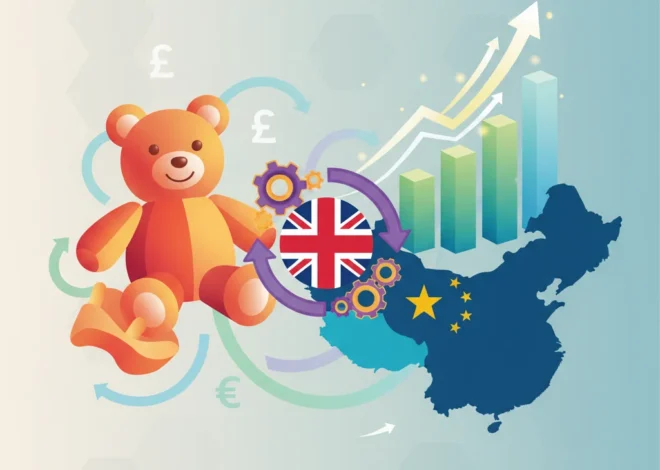
The Crown’s Balance Sheet: Devaluing a Monarchy Through Reputational Risk
In the world of high-stakes finance and investing, we are accustomed to analyzing risk. We build complex models to price credit risk, market risk, and operational risk. But what happens when the asset under scrutiny isn’t a stock or a bond, but a centuries-old institution? The ongoing scandal surrounding Prince Andrew and his connections to the convicted sex offender Jeffrey Epstein offers a compelling, real-world case study in the most unpredictable risk of all: reputational risk.
A recent report from the Financial Times highlights the British government’s confused and backtracking response to new details, a clear signal of institutional paralysis. This isn’t just a public relations nightmare for the Royal Family; it’s a significant devaluation of a major component of the UK’s global brand. For investors, business leaders, and financial professionals, the saga provides critical lessons on how quickly credibility—the most valuable and intangible asset on any balance sheet—can be eroded, and the contagion effect that follows.
The Monarchy: A Multi-Billion Pound “Firm” Facing a Hostile Takeover by Scandal
To understand the financial implications, we must first view the British monarchy not as a family, but as “The Firm”—a term the royals themselves have reportedly used. This “Firm” is a powerful brand with tangible economic benefits. In 2017, consulting firm Brand Finance estimated the monarchy’s capital value at £67.5 billion, with a tangible annual contribution to the UK economy of £1.766 billion. This value is generated through tourism, trade uplift via royal charters and international tours, media exposure, and the premium it adds to British brands.
This economic engine runs on a single, crucial fuel: public goodwill and perceived integrity. The Prince Andrew scandal directly attacks this fuel source. The allegations of sexual assault, his disastrous 2019 BBC Newsnight interview, and the subsequent civil settlement have acted like a corrosive agent on the brand’s core. The government’s fumbling—as noted by experts in the FT article—shows that the damage isn’t contained within palace walls. It creates uncertainty and undermines the very stability the monarchy is meant to represent, a stability that indirectly benefits the UK’s broader economy and investment appeal.
When an institution’s leadership appears unable to decisively manage a crisis, it signals a governance failure. In corporate terms, this is a red flag for any investor. The stock market punishes such indecision, and in the market of public opinion, the principle is the same.
The Miller Doctrine: Decoding the Economic Blueprint for a Potential Second Trump Term
To conceptualize the ongoing impact, we can look at the monarchy’s brand equity through a simplified reputational ledger. This table illustrates the push and pull of positive and negative events on the institution’s overall value proposition.
| Brand Assets (Value-Accretive Events) | Brand Liabilities (Value-Destructive Events) |
|---|---|
| Queen Elizabeth II’s Platinum Jubilee (Unity, Stability) | Prince Andrew & Epstein Scandal (Credibility, Trust) |
| Royal Weddings (Global Media Appeal, Tourism) | Harry & Meghan’s Departure & Allegations (Internal Division) |
| The Prince’s Trust Charity Work (Social Goodwill) | “Cash for Honours” Allegations (Integrity Concerns) |
| Continuity of Succession (King Charles III) | Public Debates on Funding & Relevance (Questioned ROI) |
From Personal Failing to Systemic Risk: The Economics of Contagion
In the financial world, contagion is the spread of a market disturbance from one entity to the rest of the system. The Prince Andrew affair is a textbook example of reputational contagion. His personal crisis has not remained his own; it has infected the entire institution and, by extension, the national brand.
This matters for the hard-nosed world of finance and economics. Here’s why:
- Erosion of “Soft Power”: The UK’s global influence, or “soft power,” is partly built on the allure and perceived dignity of the monarchy. This power translates into favorable trade relationships and cultural exports. A scandal-plagued monarchy weakens this tool, potentially impacting the broader UK economy.
- Investor Perception: While no one is basing their trading decisions on royal headlines, institutional stability is a key macro-indicator for international investors. A monarchy mired in crisis contributes to a narrative of a UK struggling with its identity and governance post-Brexit, which can subtly influence foreign direct investment.
- The “Key Person” Risk Writ Large: The scandal exposes the immense “key person risk” inherent in an institution built on heredity rather than merit. In any corporation, a board would have removed such a toxic executive. The monarchy’s inability to do so cleanly highlights a structural vulnerability that would be unacceptable in modern banking or corporate governance.
Lessons in Crisis Management for the Modern Leader
Beyond the palace gates, this royal crisis offers invaluable lessons for any leader in business or finance. The monarchy’s missteps are a masterclass in what not to do when managing a reputational firestorm.
- The Cost of Indecision: The initial failure to decisively and permanently distance the institution from Prince Andrew allowed the narrative to fester. In both the stock market and the court of public opinion, swift, clear action is rewarded, while hesitation is punished.
- Transparency Over Obfuscation: The infamous BBC interview was an attempt at narrative control that backfired spectacularly because it lacked candor and accountability. In today’s economy, stakeholders demand transparency. Whether you’re in banking or blockchain, trust is built by owning your failures, not by offering implausible denials.
- Brand Values Are Non-Negotiable: An organization’s values are only real if they are upheld in a crisis. By appearing to protect one of its own at the expense of its institutional integrity, the monarchy has signaled to the public that its internal loyalties may outweigh its public duty. This is a fatal error for any brand.
Déjà Vu or a Different Devil? Unpacking the New Wave of US Banking Jitters
The UK government’s apparent confusion, as reported by the FT, is the final piece of this cautionary tale. It shows that when a core national institution is weakened, it creates a vacuum of leadership that can even paralyze political decision-making. This interconnectedness is something every economist and investor understands. No part of the system operates in a vacuum; a significant failure in one area will inevitably ripple through the entire economy.
The Dragon's Grip: Why China's Social Crackdown is a Critical Red Flag for Global Investors
The Final Accounting: A Permanent Mark on the Ledger
The Prince Andrew scandal is more than a fleeting headline. It is a permanent entry on the monarchy’s historical ledger—a significant liability that will weigh down its brand equity for a generation. It has accelerated questions about the institution’s purpose, cost, and governance in the 21st century.
For those of us in the world of finance, trading, and economics, it serves as a powerful reminder that the most sophisticated financial models are meaningless without an appreciation for the human elements of trust, reputation, and public confidence. The British monarchy is learning this lesson in the most public and painful way possible: that once credibility is spent, it is the most difficult asset to buy back, at any price.


